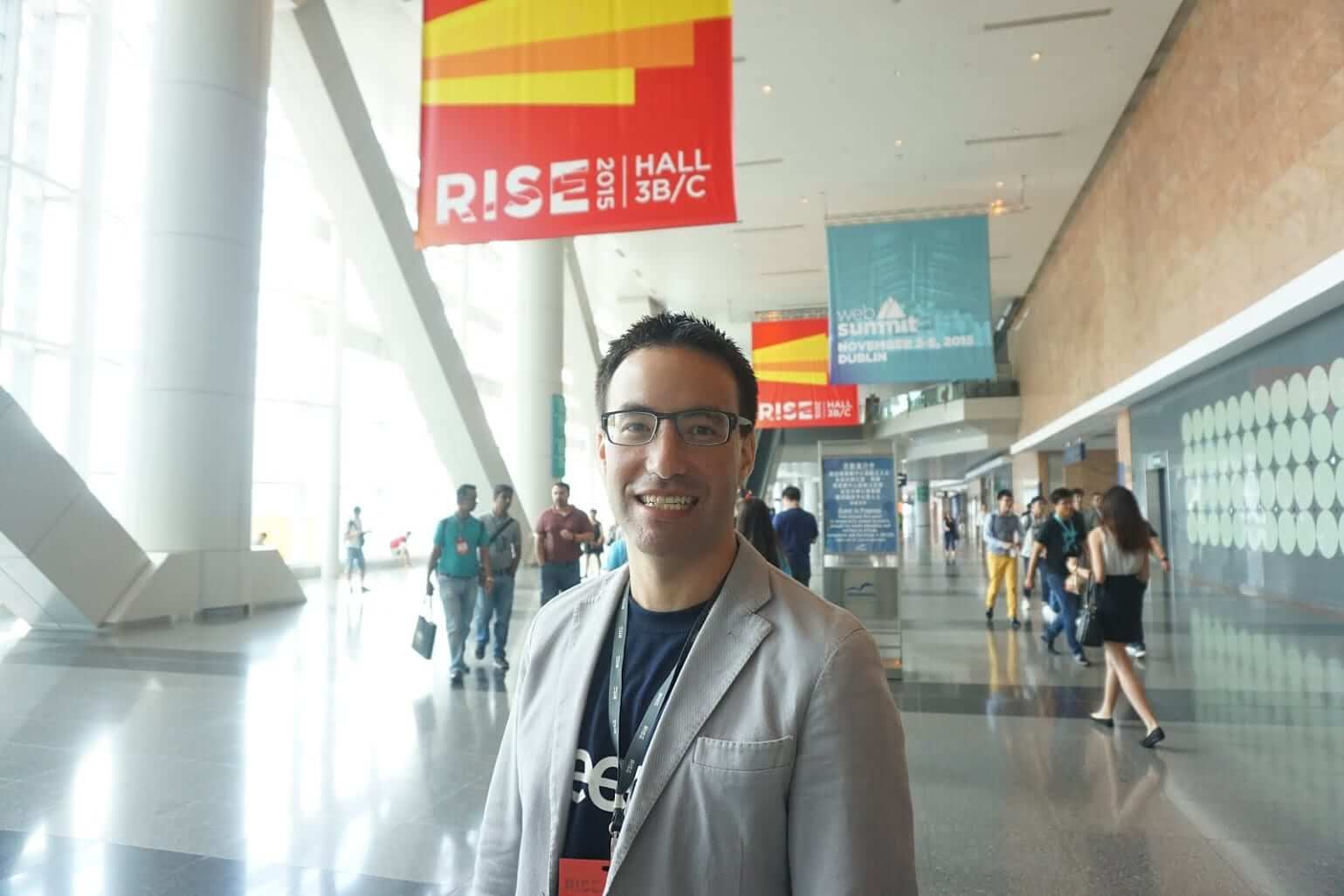David Ng was born in Singapore, but raised in California. His father is Chinese Singaporean and his mother is American, so David found it in his blood to bounce back between East and West. David studied Film and Chinese studies at UC Berkeley, and later obtained a JD from Southwestern Law School in Los Angeles. Contrary to expectations, David was able to leverage his Cal degrees by working for some Film companies in Singapore (Shaw and Cathay) and a Chinese company Chinacache, where he was able to work myself up to a director out of their LA office and watched them go IPO. David is currently back living full time in Singapore, and enjoy travel, basketball and film and shopping for things I don’t need. He speaks to The Asian Entrepreneur today about Deepo, his startup.
In your own words what is Deepo?
Deepo is an AI that helps marketers and editors of websites to show content recommendations easily, and to obtain reports and insights on their data.
How did you come up with the idea of Deepo?
We created Deepo out of frustration from having to educate marketers about the best way to use their data to help them engage their users better.
Could you walk us through the process of starting up Deepo?
A few of us at Gimmie a few months back for brainstorming on how we could automate tasks we were doing for our customers. We eventually decided lets copy Google who has their Google X for all the cool stuff they are working on and come up with GimmieX. We had some good attempts, but they all failed for one reason or another. However, each failure helped get us closer to realizing some of the fundamental problems our customers were facing and made us key in on two we thought we could directly help. We then tried to turn GimmieX into a Gimmie Product, but some of our customers were confused because it was dramatically different than our full service and custom solutions provide by Gimmie.
That eventually led us down the path to decide to launch a new company, and for me personally to pass the baton to a new management team at Gimmie.
Was anything in particular challenging at the time?
Every day is a challenge. Some times we’re so tired we forget what time it is, or forgetting our keys. In the business, how do we describe something that contains parts of many other companies? How to scale from no users, to milllions and millions in a very short time frame? These were and remain some of our ongoing challenges, although we’re better at remembering our keys now!
How have you been developing Deepo since startup?
We push changes every few days doing continuous deployment, and have found some good online tools that help us do that (circleCI). We also have a semi-Scrum agile development process using Pivotal Tracker, which gives us some structure. The most important tools for our development have been a combo of Slack + Github the best tool is communication.
What kind of feedback did you get for Deepo so far?
People have been very positive about our direction, to the extent of supporting us even though they know some of the features are not yet ready because they see the value even at our early stage. We’ve really been proud we’ve been able to help some of our customers and that’s what motivates us each day to do better. For instance Rohit Saran, Editor of Khaleej Times said it was something he has never seen before,
What is your strategy against your competition?
We see a lot of siloed solutions out there for doing parts of what we do. For instance, you could use Outbrain for your recommendations. But then you’d need Chartbeat to get a dashboard of your analytics and attention minutes of how that content is performing, and Automated Insights to present to you human like written reports written by machines to share with your management, and finally Optimizely to see if your content recommendations are even helpful for you in the first place.
Deepo automates several services and takes over the role of the people who would have to use and setup them – developers, analysts, marketers. We are focused on letting machines do the work that marketers have been doing as opposed to our competitors who supply tech for marketers to use.
What can you tell us about the industry?
Marketing tech already has 29 “unicorns” worth USD $1B
http://venturebeat.com/2015/04/30/29-martech-unicorns-there-are-now-almost-30-1b-marketing-technology-vendors/
The market size varies anywhere from $1.5 B in 2015 to $120B. In the next few years experts say it is worth around $32B based on increased Marketing spending as it focuses on data driven marketing.
What is the future of the industry?
I believe strongly that digital marketers are great at strategy, planning, creative and design. However I don’t think they are trained to know how to analyze data in real time and make decisions on what content to show for every user on their site. For that, machines are better equipped, and with machine learning and advanced data science like predictive analytics, it’s now possible to automate many tasks and provide as a service.
Currently Data Scientists are in short supply, and for the lucky few marketers that work with them, more often than not in our experience we find the business prioritizes their product first over the efforts of the marketers (conversions, signups, time spent on site, etc).
In the next 5-10 years I think that the gulf between marketing and data science will decrease and eventually marketers will be making all decisions based off data with a combo team of marketing and data science backgrounds.
But before that, we are hoping some of them will want to use Deepo to act as their virtual data scientist and help them automatically show the best content and tell them hidden insights about their data.
Were there anything that disappointed you initially?
We’re too early to have disappointments ! Just kidding.
One lesson I’ve learned though from Gimmie, is to focus on customers that have a need as opposed to having to push a sale.
Initially we were targeting smaller companies with Deepo thinking it’d be easier to get started, but we realized that Deepo wasn’t always a good fit because there is no need to have content recommendations and engagement if you don’t have enough users first. So since, we’ve learned to focus on companies that are mature enough to focus on engagement as opposed to just growing traffic to the site.
What do you think about being an entrepreneur in Asia?
When I first came to Singapore from the Bay Area, I was often asked what’s it like to be a founder from Silicon Valley. Now more often than not, I hear from my friends back there whats it’s like in Asia ! I think this is the sign that the startup scene is starting to mature out here in Singapore. From Gimmie, I got to do a lot of business in the region, working in Indonesia, Philippines, Malaysia and visiting several other countries.
For the most part, its a fun experience but one in which you feel more isolated compared to the the Valley.
There is a tendency to be more protective of ones times and ideas here, and sharing isn’t quite as common as I was used too. Because there are so many expats from all over the world, it’s really a global type setting which is a great where to learn about new business ideas and models and other cultures. Every country has their own differences and I think that applies to the startup scene.
From a Singapore perspective, with English being the defacto work language, its hard to even say that Singapore is typical of startups in Asia. I think there is Singapore and then every other country. In Singapore, its not common to see other startups while shopping, or seeing your friends who are dating someone in another startup.
It’s a really vibrant scene and for the most part very helpful. In the other countries there are really small clicks where everyone knows everyone. I’ve met so many great people though its really been amazing and have played basketball in almost every country I’ve visited with other statup folks!
Now that the industry is more mature than even 3 years ago when I moved back, I’ve seen now 2nd generation web and mobile enterpreneurs who are giving back to the community. I’ve been lucky for instance to have people like Dennis Goh from Hungrygowhere fame help mentor me over at Wavemaker.
For me personally, as I said in the opening I think I can get by equally in the Valley or here in Asia. However, if I didn’t have my background, I’d say that starting out in the Valley is easier because you’ll learn, fail and succeed faster just because the competition is so high you are forced to bring your A game. In Asia, things are a bit more relaxed which suits me fine, but you have to continually push yourself to achieve because there just isn’t the same level of competition.
What is your opinion on Asian entrepreneurship vs Western entrepreneurship?
US style is all about competing and overcoming the odds, innovation and big ideas. Asian stye is more about surviving enough, making money, and if lucky get to dream big. I think that’s not always true, but for the most part people here tend to want to solve local problems as opposed to global ones. The good news is that with more investors investing in the region, people can start dreaming big even in Asia.
What is your definition of success?
Success for me is what difference I’ve made in helping others. Have I helped my customers. Have I helped my colleagues, have I helped my investors. Did I make my family proud? In the end you don’t measure success yourself, but rather those around you will tell you. Sometimes it can be measured in milestones, other times it might be in the intangibles like giving a helping hand when they are down. I consider anything I do to making a positive difference in the world and providing new ideas, new innovations as a measure of success. Money should just be a result, but not the yardstick.
Why did you decide to become an entrepreneur?
I made up my mind long ago, that I have strong opinions and ideas. For me being an entrepreneur is all about self expression, to be able to jump off any cliff I want at any time. If I try whats the worst that can happen? I fall down and fail. But If I work 8-5 for a large corp or to work in a law firm its about the grind and happiness comes from money, and thats not what motivates me. I’m more of an intrinsic rewards type of guy, so nothing is more rewarding than starting up something new against all odds with a bunch of people I like working with.
For me its all about the daily grind. I actually already wrote about this here:
https://www.linkedin.com/pulse/what-means-show-up-work-startup-david-ng-%E4%BC%8D-%E7%AB%8B%E4%BC%9F?trk=prof-post
In your opinion, what are the keys to entrepreneurial success?
Vision, Passion, Execution. If I had to rank I’d say
Execution, Passion, Vision in that order.
You can be a dreamer but in the end you need to get S done. I have always had the passion, and at least some form of vision even if blurry ! For me my entire focus now is on execution.
Make every day count, and stay level when you fail and succeed. Own your own work rhythm and don’t ever compare yourselves to others good or bad. No idea is impossible if you have the right team and commitment.
As a leader you need to have conviction and charisma, and the first person you must convince above all else to step out there on the court of entrepreneurship is yourself. Once you go out there onto the court, the fans and everyone else in the stadium don’t matter. Some might not like you, the opposing team is out to get you, and some teammates may even doubt you. So you have to really be passionate with enough drive to block out everything else, and focus doing things you love and that starts with self conviction. From there you can start to convince others to share your dream. In the end work hard and you will get respect, people will remember your name win lose or draw.
Connect































